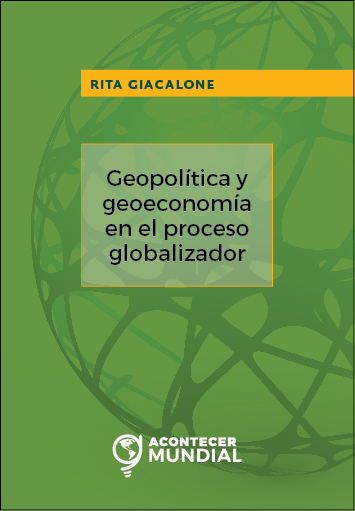Geopolítica y geoeconomía en el proceso globalizador
Este libro de investigación tiene como objetivos: 1) analizar los elementos geopolíticos y geoeconómicos que incidieron en el desarrollo del sistema internacional; 2) identificar cuáles de esos elementos están vigentes en el siglo xxi; y 3) presentar algunos escenarios futuros para ese sistema. Su punto de partida es que la comprensión de lo sucedido en el proceso globalizador desde la Paz de Westfalia (siglo xvii) hasta la actualidad, es necesaria para entender en toda su complejidad el panorama global en que vivimos. El libro identifica, describe y hace comprensibles los aspectos geopolíticos y geoeconómicos del mundo actual y sus posibilidades futuras, una tarea en la que la historia económica juega un rol fundamental por la interacción entre intereses de Estados, empresas transnacionales, organizaciones multilaterales, etc. El libro destaca el surgimiento de otros actores distintos del Estado-nación nacido en la Paz de Westfalia, y que también este último, y el sistema en que interactúa, han sufrido transformaciones importantes. Se plantea como unidad de análisis al binomio geopolítica-geoeconomía, empleando el marco interpretativo de la teoría del juego evolutivo de Krasner. Se discute el proceso globalizador en distintas etapas a partir de su interrelación con el pensamiento económico y la tecnología, evitando caer en la simplificación teórica que suele dominar este campo de estudio.
-
Introducción
-
Estructuración de un sistema internacional en el mundo moderno
-
Factores geopolíticos y geoeconómicos de poder mundial
-
El siglo xx: transición del balance de poder europeo al sistema bipolar
-
El siglo xxi: del unilateralismo hacia la multipolaridad y el regionalismo
-
Organización geopolítica y escenarios del proceso globalizador por regiones
-
Anexos
-
Indice Analítico
Academia Mexicana de la Lengua. (s. f.). Mundo global. Recuperado de http://www.academia.org.mx/spin/Detalle?id=261
Acharya, A. (2014). The End of the American World Order. Cambridge, UK: Polity Press.
Alarcón, F. (2014, marzo 28). El collar de perlas de China: Geopolítica en el Índico. El Orden Mundial en el S. xxi. Recuperado de http://elordenmundial.com/regiones/el-collar-de-perlas-chino/
Alarcón, F. (2016, enero 1). El África subsahariana en 2016: intentando dejar atrás los fantasmas. El Orden Mundial en el S. xxi. Recuperado de http://elordenmundial.com/regiones/el-africa-subsahariana-en-2016/
Alloza Aparicio, A. y Cárceles de Gea, B. (2009). Comercio y riqueza en el siglo xvii: Estudios sobre cultura, política y pensamiento económico. Madrid: csic.
Altvater, E. y Manhkopf, B. (2002). Las limitaciones de la globalización: Economía, ecología y política de la globalización. México: Siglo xxi.Recuperado de http://colegiodesociologosperu.org/nw/biblioteca/Las%20limitaciones%20de%20la%20globalziacion.%20Elmar%20
Altvater%20y%20Birgit%20Mahnkop.pdf
Appadurai, A. (2000). Grassroots Globalization and the Research Imagination. Public Culture, 12(1), 1-19.
Appadurai, A. (2006). The right to research. Globalisation, Societies and Education, 4(2), 167-177.
Aranda, L. (2015, junio 18). ¿Expansión o recuperación? El avance de China sobre el mar del Sur. El Financiero. Recuperado de http://
www.elfinanciero.com.mx/opinion/expansion-o-recuperacion-elavance-de-china-sobre-el-mar-del-sur.html
Aron, R. (1985). Paz y guerra entre las naciones. Vol. 1. Madrid: Alianza.
Astié-Burgos, W. (2014). De la Guerra Fría al siglo xxi: Una difícil transición para la onu. En M. C. Rosas (Coord.), 60 años de la onu: ¿Qué
debe cambiar? (pp. 65-79). México: Centro de Análisis e Investigación sobre Paz, Seguridad y Desarrollo - anu.
Bach, D. (2005). The Global Politics of Regionalism: Africa. En M. Farrell, B. Hettne y L. van Langenhove (Eds.), Global Politics of Regionalism. Theory and Practice (pp. 171-186). London: Pluto Press.
Baldwin, R. (2006). Multilateralising Regionalism: Spaghetti Bowls as Building Blocs on the Path to Global Free Trade. The World Economy, 29(11), 1451-1518.
Baldwin, R. (2011). 21st Century Regionalism: Filling the Gap between 21st Century Trade and 20th Century Trade Rules. cepr Policy Insight, 56.
Baños Bajo, P. (2010). Conflicto y violencia al sur del Sahara en España. En La importancia geoestratégica del África subsahariana (pp. 99-159). Madrid: Ministerio de Defensa. Centro Superior de Estudios de la Defensa Nacional.
Barnes, R. (2014). The US, The UN, and the Korean War. Communism in the Far East and the American Struggle for Hegemony in the Cold War. London: I. B. Tauris.
Baru, S. (2012, marzo 23-25). A New Era of Geo-economics: Assessing the Interplay of Economic and Political Risk. iiss Geo-economics and Strategy Programme. Seminar.
Bassets, M. (2015, julio 14). Estados Unidos e Irán alcanzan histórico pacto nuclear. El País Recuperado de http://internacional.elpais.com/internacional/2015/07/12/actualidad/1436703308_390523.html
Bearce, D. y Omori, S. (2005). How Do Commercial Institutions Promote Peace? Journal of Peace Research, 42(6), 659-678.
Beeson, M. (2010). Asymmetrical Regionalism: China, Southeast Asia and Uneven Development. East Asia, 27, 329-343.
Beeson, M. y Broome, A. (2010, diciembre). Hegemonic Instability and East Asia: Contradictions, Crises and US Power. Globalizations, 7(4), 507-523.
Bernstein, W. J. (2008). A Splendid Exchange. How Trade Shape the World. New York: Grove Press.
Betts, R. F. (2015). Europe in Retrospect. A Brief History of the Past Two Hundred Years. Recuperado de http://www.britannia.com/history/euro/index2.html
Bhalla, R. (2016, febrero 16). Ruthless and Sober in Syria. Geopolitical Weekly. Recuperado de https://stratfor.com/weekly/ruthless-and
-sober-syria?utm_source=freelistf&utm_medium=email&utm_campaign=Weekendcontent4&utm_content=bodylink2&_hsenc=
p2ANqtz9AYYfwK3J1f5071O2SJE6xaWcow9rEKGb1oaINlmaanaV2cFqtZNaOVARC7buxjwnqw1Mmx-OmuauzmoAOEltPjvyCg&_ hsmi=27212622
Bianchi, E. y Szpak, C. (2013). Cadenas globales de producción: Implicancias para el comercio internacional y su gobernanza. Buenos Aires: Cátedra omc flacso Argentina.
Black, J. (2016). Geopolitics and the Quest for Dominance. Bloomington: Indiana University Press.
Blin, A. y Marin, G. (2009, enero 7). La onu en perspectiva. Forum for a new World Governance. Recuperado de http://www.world-governance.org/article422.html?lang=en
Bodin, J. (1576/1992). Los seis libros de la República. Madrid: Technos.
Boniface, P. (1996). La volonté d’impuissance: La fin des ambitions internationales et strategiques? Paris: Éditions du Seuil/L’Histoire Immédiate.
Boria, E. (2013). Geographers and Maps: A Relationship in Crisis. L´Espace Politique, 21(3). Recuperado de https://espacepolitique.revues.org/2802
Braudel, F. (2002). La dinámica del capitalismo. México: Breviarios del Fondo de Cultura Económica.
Braun, R. A. y McGrattan, E. R. (1993). The Macroeconomics of War and Peace. En O. Blanchard y S. Fischer (Eds.), nber Macroeconomics
Annual 1993 (pp. 197-258). Vol. 8. Boston: MIT Press. Recuperado de http://nber.org/chapters/c11001.pdf
Buckley, A. (2011). Financial Crisis: Causes, Context, and Consequences. New Jersey: Financial Times - Prentice Hall. Recuperado de http://catalogue.pearsoned.co.uk/assets/hip/gb/hip_gb_pearsonhighered/samplechapter/027373511X.pdf
Buzan, B. (2004). The United States and the Great Powers. World Politics in the Twenty-First Century. Cambridge, UK: Polity Press.
Buzan, B. y Little, R. (2000, primavera). One World or Two? En Y. Ferguson, R. Mansbach, R. Denemark, H. Spruyt, B. Buzan, R. Little,
& M. Mann. (Eds.). What is the Polity? A Roundtable. International Studies Review, 2(1), 17-21.
Byrd, R. H. (1971, diciembre). Social Darwinism and British Imperialism, 1870-1900 (Master of Arts Thesis in History). Texas Tech University.
Campins Eritja, M. (2009, mayo 18). La gestión de los cursos de aguas internacionales en Asia Central: ¿Amenaza u oportunidad?
Madrid: Observatorio Asia Central. Real Instituto Elcano, ARI 77. Recuperado de http://realinstitutoelcano.org/wps/portal/rielcano/
Imprimir?WCM_GLOBAL_CONTEXT=/elcano/Elcano_es/Zonas_es/ARI77-2009
Cattaneo, O., Gereffi, G. y Staritz, C. (2010). Introduction. En O. Cattaneo,
G. Gereffi y C. Staritz (Eds.), Global Value Chains in a Postcrisis World. A Development Perspective (pp. 3-20). Washington D.C.: The WorldBank.
cepal. (2013). Panorama de la Inserción Internacional de América Latina y el Caribe 2013. Santiago de Chile: cepal.
Chandler, A. D. (1977). The Visible Hand: The Managerial Revolution in American Business. Cambridge: The Belknap Press.
Chandler, A. D. (1990). Scale and Scope: The Dynamics of Industrial Capitalism. Cambridge: The Belknap Press of Harvard University.
Cháves Palacios, J. (2004). Desarrollo tecnológico en la primera Revolución Industrial. Norba Revista de Historia, 17, 93-109.
Chen, L. y De Lombaerde, P. (2014). Testing the Relationships between Globalization, Regionalization and Regional Hubness of the BRICS. Journal of Policy Modeling, 26(1), 111-131.
Church, P. (2009). A Short History of South-East Asia. Singapore: John Wiley and Sons.
Clingingsmith, D. y Williamson, J. (2005). Mughal Decline, Climate Change, and Britain´s Industrial Ascent: An Integrated Perspective
on India´s 18th and 19th Centuries Deindustrialization. Cambridge, Massachusetts: National Bureau of Economic Research. Working
Paper Series 11730. Recuperado de http://scholar.harvard.edu/files/jwilliamson/files/w11730.pdf?m=1363892972
Coleman, D. C. (1983). Proto Industrialization. A Concept Too Many. Economic History Review, xxxiv, 435-448.
Conte, C. y Karr, A. (2001). An outline of the U.S. economy (actualizado en 2012). Washington: U.S. Department of State. Recuperado de
https://searchworks.stanford.edu/view/6504442
Corbett, J. (2013, noviembre 2). Oil Geopolitics in the 21st Century. The International Forecaster Weekly. Recuperado de http://theinternationalforecaster.com/International_Forecaster_Weekly/Oil_
Geopolitics_in_the_21st_Century Crecimiento demográfico: el reto del siglo xxi (2011). Revista de la otan. Recuperado de http://www.nato.int/docu/review/2011/Climate-Action/Population_growth_challenge/ES/
Daojiong, Z. (2006, primavera). China´s Energy Security: Domestic and International Issues. Survival, 48(1), 179-190.
Daojiong, Z. (2006, verano). Energy Interdependence. China Security 2(2), 2-16.
Dasgupta, S. (2009). Acknowlegedments. En S. Dasgupta y J. N. Pieterse (Eds.), Politics of Globalization (pp. x-xiii). New Delhi: Sage
Publications.
Deane, P. (1989). La primera Revolución Industrial. Madrid: Península.
De Lombaerde, P. y Schultz, M. (2009). eu Support to Regional Integration Worldwide and the “Makability” of Regions: Conclusions. En P. de Lombaerde y M. Schultz (Eds.), The eu and World Regionalism. The Makability of Regions in the 21st Century (pp. 287-292). Farnham,
England: Ashgate. De Mateo y Sousa, E. (1993, octubre). De la geopolítica a la geoeconomía: una lectura del siglo xx. Comercio Exterior, 974-978. Recuperado de http://revistas.bancomext.gob.mx/rce/magazines/251/9/RCE9.pdf
De Sousa, L. (2011, mayo 27). Peak Oil and the Fall of the Soviet Union: Lessons on the Twentieth Anniversary of the Collapse. The Oil Drum. Recuperado de http://theoildrum.com/node/7878
Del Arenal, C. (2001). La nueva sociedad mundial y las nuevas realidades internacionales: Un reto para la teoría y para la política. Recuperado de http://ehu.eus/cursosderechointernacionalvitoria/ponencias/pdf/
/2001_1.pdf
Dierkxens, W. (2015, enero 18). El futuro de la humanidad ante la situación geopolítica actual: El rol de la integración latinoamericana.
Observatorio Internacional de la Crisis. Recuperado de http://observatoriodelacrisis.org/2015/01/el-futuro-de-la-humanidadante-
la-situacion-geopolitica-actual-el-rol-de-la-integracion-latinoamericana/
Dieter, H. (2015, julio). El retorno de la geopolítica. La política comercial en la era del tipp y el tpp. Buenos Aires: Nueva Sociedad.
Colección Mundo. Recuperado de http://nuso.org/documento/el-retorno-de-la-geopolitica/
Dimaranan, B., Ianchovichina, E. y Martin, W. (2008). Compitiendo con gigantes. ¿Quién gana, quién pierde? En L. A. Winters y S. Yusuf
(Eds.), China, India y la economía mundial (pp. 67-97). Bogotá: Banco Mundial - Mayol Ediciones.
Dobado, R., Gómez Galvarriato, A. y Williamson, J. G. (2008, septiembre). Mexican Exceptionalism: Globalization and De-Industrialization
-1877. Journal of Economic History, 68, 1-53.
Dobb, M. (1946/1976). Estudios sobre el desarrollo del capitalismo. Madrid: Siglo xxi.
Domínguez Torreiro, M. (2004). El papel de la fisiocracia en nuestros días: Una reflexión sobre el análisis económico de los recursos naturales y el medio ambiente. Revista Galega de Economia, 13(1-2), 1-12.
Drezner, D. W. (2001). Globalization and policy convergence. International Studies Review, 3(1), 53-78.
Eccles, W. J. (1973). France in America. Nueva York: Harper & Row. El diseño del nuevo orden mundial. Los tratados de paz (2003). En
Historia de las Relaciones Internacionales del Siglo xx. Recuperado de http://www.historiasiglo20.org/IIGM/tratados.htm
Essex, J. (2013). Development, Security, and Aid. Geopolitics and Geoeconomics at the US Agency for International Development. Athens y London: The University of Georgia Press.
Ezrow, N. (2015). Authoritarian Breakdown in the Arab World: Linkages, Leverage, and Regime Type. The Journal of International Relations, Peace Studies, and Development, 1(1). Recuperado de http://scholarworks.arcadia.edu/agsjournal/vol1/iss1/3
Falck Reyes, M. (2004, enero-abril). La apertura de China y Japón en el siglo xix. México y la Cuenca del Pacífico, 7(21), 18-29. Recuperado
en%20el%20siglo%20XIX.pdf
Fazio Vengoa, H. (1998). La política internacional de la integración europea. Bogotá: iepri-Universidad Nacional de Colombia.
Ferguson, N. (2010). Niall Ferguson illuminates historic upheavals by analyzing financial markets. The Yard Magazine. Recuperado de
http://historynewsnetwork.org/article/132751
Ferguson, Y. y Mansbach, R. (2000). What is the Polity? International Studies Review, 2(1), 3-31.
Fernández, R. (2014, marzo 18). Putin firma la anexión de Crimea a Rusia. El País. Recuperado de http://internacional.elpais.com/internacional/2014/03/18/actualidad/1395125826_603105.html
Florescano, E. (Coord.) (1975). Haciendas, latifundios y plantaciones en América Latina. México: clacso-Siglo xxi.
Foqué, R. y Steenbergen, J. (2005). Regionalism: A Constitutional Framework for Global Challenges? En M. Farrell, B. Hettne, B. y
L. Van Langenhove (Eds.). Global Politics of Regionalism. Theory and Practice (pp. 54-68). London: Pluto Press.
Forsberg, A. (2000). America and the Japanese Miracle: The Cold War Context of Japan´s Postwar Economic Revival, 1950-1960. Chapel
Hill-London: University of North Carolina Press.
Frank, A. (1998). Re-Orient: Global Economy in the Asian Age. Berkeley, California: University of California Press.
Friedman, G. (2008, junio 15). The Geopolitics of China: A Great Power Enclosed. Stratfor. Recuperado de: https://www.stratfor.com/sample/analysis/geopolitics-china-great-power-enclosed
Friedman, M. (1992). Libertad de elegir. Madrid: Planeta.
Friedman, M. y Schwartz, A. J. (1963). A Monetary History of the United States, 1867-1960. Princeton: Princeton University Press.
Fuchs, D. (2007). Business Power in Global Governance. Boulder, Colorado: Lynn Rienner.
Fuentes, A. y Villanueva, J. (1989). Economía mundial e Integración de América Latina. Buenos Aires: bid-intal.
Fukuyama, F. (1992). The End of History and the Last Man. New York:Free Press.
Gaddis, J. L. (2013). On Starting All Over Again: A Naive Approach to the Study of the Cold War. En O. A. Westad (Ed.), Reviewing the Cold War:Approaches, Interpretations, Theory (pp. 27-42). London: Routledge.
Garzón, J. F. (2015, enero). Multipolarity and the Future of Regionalism: Latin America and Beyond. giga Working Paper 264. Recuperado de https://giga-hamburg.de/en/system/files/publications/wp264_garzon.pdf
Galbraith, J. K. (1955). The Great Crash, 1929. Boston: Houghton-Mifflin.
Giacalone, R. (2013a, julio-diciembre). Cambios en el regionalismo sudamericano por la proyección global de Brasil. Aldea Mundo, 18(36),9-21.
Giacalone, R. (2013b). La cooperación Sur-Sur de los poderes regionales. El caso de Brasil. Mural Internacional, 4(2), 26-35.
Giacalone, R. (2015). Latin American Answers to Mega-Regional Projects: Options and Limits. En J. Roy (Ed.), The European Union,
the US and Latin America (pp. 175-182). Miami: Miami - Florida European Union Centre.
Gibbs, D. N. (2006, junio). Reassessing Soviet Motives for Invading Afghanistan: A Declassified History. Critical Asian Studies, 38(2),
-263. Recuperado de http://www.politicsforum.org/forum/viewtopic.php?f=65&t=99552
Glantz, D. M. (1992/2005). The Military Strategy of the Soviet Union. A History. Oxon, UK: Frank Cass.
Gligorov, V. (2015, julio 29). Geo-economics and Geopolitics: The Notion of Dependence. The Vienna Insittute for International
Economic Studies. Recuperado de http://wiiw.ac.at/geo-economics-and-geopolitics-the-notion-of-dependence-n-103.html
Gompert, D., Binnendijk, H. y Lin, B. (2014). Blinders, Blunders, and Wars: What America and China Can Learn. Santa Monica, California: Rand Corporation. Recuperado de http://rand.org/pubs/research_reports/RR768.html
Góngora, M. (1998). Estudios sobre la historia colonial de Hispanoamérica. Santiago de Chile: Editorial Universitaria.
Goodman, M. y Khana, P. (2013, enero-febrero). The Power of Moore´s Law in a World of Geotechnology. The National Interest, 123, 64-73.
Gorraiz López, G. (2014, mayo 31). La nueva arquitectura geopolítica europea.% attac España. Recuperado de http://attac.es/2014/05/31/la-nueva-arquitectura-geopolitica-europea/
Grabendorff, W. (2016, febrero). América Latina: Una nueva geopolítica. UN Periódico, 196. Recuperado de http://www.unperiodico.unal.edu.co/dper/article/america-latina-una-nueva-geopolitica.html
Graham, R. (1972). Independence in Latin America. A Comparative Approach. New York: Alfred. A. Knopf.
Granados Erazo, O. (2010, enero-junio). Imperios y colonialismo, 1870-1914: ¿Una era de globalización, nacionalismo económico
o geopolítica? Revista de Relaciones Internacionales, Estrategia y Seguridad, 5(1), 51-82. Recuperado de http://scielo.org.co/scielo.
php?pid=S1909-30632010000100004&script=sci_arttext
Graziani, T. (2009, diciembre 1). África en el sistema multipolar. Geopolítica. Recuperado de http://geopolitica-rivista.org/6787/africa-
en-el-sistema-multipolar.html
Hamilton, E. J. (1932/2000). El tesoro americano y la revolución de los precios en España, 1501-1650. Madrid: Grupo Planeta.
Hardach, G. (1986). La Primera Guerra Mundial, 1914-1918. Barcelona: Crítica.
Hardacre, A. (2009). The Rise and Fall of Interregionalism in EU External Relations. Dordrecht: Republic of Letters.
Hartwell, R. M. (1974). The Long Debate on Poverty. Cambridge, Massachusetts: The Institute of Economic Affairs.
Heininen, L. y Nicol, H. (2008, marzo). Canada and the New Geopolitics of the North Pacific Rim. Position Paper for the 5th Northern
Research Forum (nrf) Open Assembly, Draft August. Anchorage, Alaska: March 2009. Recuperado de http://rha.is/static/files/NRF/
OpenAssemblies/Anchorage2008/northpacificrim_pp_nrf2008_nicolheininen1.pdf
Hellerstein, T. (2016, marzo 6). What Modern Syria Can Learn from the Ottomans. Stratfor Analysis. Recuperado de https://stratfor.com/
analysis/what-modern-syria-can-learn-ottomans??utm_source=-freelist-f&utm_medium=email&utm_campaign=Weekendcontent4&
utm_content=bodylink1&_hsenc=p2ANqtz-_5CKmLptRFaMSqDfzTCTtRH6AgBQxKMDv17tyEnq1gEjo0XGv5CMvQq77ApD4Y6eSTFW-W_l7eirlan6aXnwXDJMujfw&_hsmi=27212622
Hobsbawm, E. (1971). En torno a los orígenes de la Revolución Industrial. Madrid: Siglo xxi.
Hobsbawn, E. (1998). Historia del Siglo xx. Buenos Aires: Crítica.
Hobson, J. M. (2012). The Eurocentric Conception of World Politics: Western International Theory, 1760-2010. Cambridge: Cambridge
University Press.
Hoekman, B. y Kostecki, M. (2001). The Political Economy of the World Trading System. The wto and Beyond. New York: Oxford University Press.
Holsti, K. (1996). The State, Wars, and the State of War. Cambridge: Cambridge University Press.
Hora, R. (2010). Historia económica argentina en el siglo xix. Buenos Aires:Siglo xxi.
Horowitz, S. y Tibursky, M. (2012). Reacting To Russia. Foreign Relations of the Former Soviet Bloc. En K. Williams, S. Lobell y N. Jesse (Eds.), Beyond Great Powers and Hegemons. Why Secondary States Support, Follow or Challenge (pp. 161-176). Stanford, California: Stanford University Press.
Hubner, K. (2014). ttip and ceta. Remaking the Atlantic Economy? En J. Roy y R. Dominguez (Eds.), The ttip. The Transatlantic Trade and
Investment Partnership between the European Union and the United States (pp. 35-50). Miami: Miami-Florida European Union Center -
Jean Monnet Chair.
Hveem, H. (2000). Explaining the Regional Phenomenon in an Era of Globalization. En R. Stubbs y G. R. D. Underhill (Eds.), Political
Economy and the Changing Global Order (pp. 70-81). Don Mills, Canada: Oxford University Press.
Ianni, O. (1996). Teorías de la globalización. México: Siglo xxi.
Iapadre, P. L. y Tajoli, L. (2014). Emerging Countries and Trade Regionalization. A Network Analysis. Journal of Policy Modeling,
(1), 89-110. Recuperado de https://ideas.repec.org/a/eee/jpolmo/v36y2014is1ps89-s110.html
Iliopoulos, I. (2009). Strategy and Geopolitics of Sea Power throughout History. Baltic Security and Defence Review, 11(2), 5-20.
Iztok, R. y Plavcanova, D. (2013). Russian Geopolitics and Geopolitics of Russia. phenomenon of space. European Journal of Geopolitics, 1,61-94.
Janicki, D. A. (2014). The British Blockcade during World War I: The Weapon of Deprivation. Student Pulse, 6(6). Recuperado de http://
studentpulse.com/a?id=899
Johnston, A. I. (2011, junio). Stability and Instability in Sino-US Relations: A Response to Yan Xuetong´s Superficial Friendship Theory. The
Chinese Journal of International Politics, 4, 5-29.
Junquera Rubio, C. (2014, noviembre 17). Análisis comparativo de las migraciones de los países del norte de África hacia los de la Unión Europea y a las diversas regiones del Golfo Pérsico. Recuperado de https://orbigoamazonas1943.wordpress.com/2014/11/17/analisiscomparativo-de-las-migraciones-de-los-paises-del-norte-de-africahacia-los-de-la-union-europea-y-a-las-diversas-regiones-del-golfopersico/
Juvelier, B. (2013, verano). China Looks to the Sea: A Historical Analysis of Geopolitical Strategy. Vanderbilt Undergraduate Research Journal, 9, 1-12.
Kagan, R. (2008). The Return of History and the End of Dreams. London: Atlantic Books.
Kaplan, R. (2009, mayo-junio). The Revenge of Geography. Foreign Policy. Recuperado de http://colorado.edu/geography/class_home
pages/geog_4712_sum09/materials/Kaplan%202009%20Revenge%20of%20Geography.pdf
Kaplinski, R. y Farooki, M. (2010). Global Value Chains, the Crisis, and the Shift of Markets from North to South. En O. Cattaneo, G.
Gereffi, y C. Staritz (Eds.), Global Value Chains in a Postcrisis World. A Development Perspective (pp. 125-153). Washington D.C.: The
World Bank.
Kemmerer, E. (1994). Gold and the Gold Standard. The Story of Gold Money Past, Present, and Future. Princeton, New Jersey: McGraw-Hill.
Keynes, J. M. (1935/2002). Las consecuencias económicas de la paz. Madrid: Crítica.
Khalil, S. (2016, enero 9). ¿Por qué Arabia e Irán han partido al Islam en dos? Asia News. Recuperado de http://religionenlibertad.com/porque-arabia-e-iran-han-partido-el-islam-en-dos-47024.htm
Khannar, P. (2008). The Second World: Empires and Influence in the New World Order. New York: Random House.
Kindleberger, C. P. (1977). The World Depression, 1929-1939. Berkeley: University of California Press.
Kleinert, J. (2001, agosto). The Role of Multinational Enterprises in Globalization: An Empirical View. Kiel Working Papers 1069.
Kolko, G. (2003). ¿Otro siglo de guerras? Barcelona: Paidós.
Kolossov, V. y O´Loughlin, J. (1998, agosto). Pseudo-states as Harbingers of a Post-modern Geopolitics: The Example of the Trans-Dniester Moldovan Republic. Paper presented at the IGU Political Geography
Conference on Nationalism and Identities in a Globalized World.Ireland.
Kondratieff, N. (1925). The Major Economic Cycles. Traducido al inglés y publicado en 1984 como The Long Wave Cycle. New York:
Richardson & Snyder.
Kramer, S. P. (2012). The Return of History in Europe. The Washington Quarterly, 35(4), 81-91.
Krasner, S. D. (2000). La soberanía perdurable. Colombia Internacional, 53, 25-42.
Krejei, O. (2005). The Geopolitics of the Central European Region: The View from Prague and Bratislava. Bratislava: veda.
Krugman, P. (1991). Geography and Trade. Cambridge: The mit Press.
Krugman, P. (2009). The Return of Depression Economics and the Crisis of 2008. New York: W.W. Norton & Co.
Kuhn, M. y Umbach, F. (2011, septiembre). The Geoeconomic and Geopolitical Implications of Unconventional Gas in Europe.
Journal of Energy Security. Recuperado de http://ensec.org/index.php?option=com_content&view=article&id=320:the-geoeconomic-
and-geopolitical-implications-of-unconventional-gas-in-europe&catid=118:content&Itemid=376
Lafer, C. (2002). La identidad internacional de Brasil. Buenos Aires: Fondo de Cultura Económica.
Lake, D. y Morgan, P. (1997). The New Regionalism in Security Affairs. En D. Lake y P. Morgan (Eds.), Regional Orders. Building Security in a New World (pp. 3-19). University Park, Pennsylvania: The Pennsylvania State University.
Landefeld, J. S. (2003, junio). Globalization and Multinational Companies: What Are the Questions, And How Well Are We Doing in Answering Them? Conference of European Statisticians. Geneva. Recuperado de http://www.bea.gov/papers/pdf/Globalization.pdf
Lane, P. y Schmukler, S. (2008). Integración financiera internacional de China e India. En L. A. Winters y S. Yusuf (Eds.), China, India y
la economía mundial (pp. 99-129). Bogotá: Banco Mundial - Mayol Ediciones.
Langlois, R. N. (2007). The Dynamics of Industrial Capitalism. Schumpeter, Chandler, and the New Economy. London: Routledge.
La rivalidad geopolítica entre India y China en el Océano Índico complica el escenario asiático (2012, mayo 6). elespiadigital.com Recuperado de http://elespiadigital.com/index.php/tribuna-libre/358-la-rivalidad-geopolitica-entre-india-y-china- en-el-oceano-indico-complica-el-escenario-asiatico
Lefebvre, G. (1970). The Coming of the French Revolution. Princeton, New Jersey: Princeton University Press.
Lemke, D. (2003). Development and War. International Studies Review, 5(4), 55-63.
Levy, J., Poncet, P. y Tricoire, E. (2004). Documentation Photographique (Paris). La Documentation Française, Dossier 8036.
Lin, M. S. (2014, diciembre 9). (International Relations) Assistance and Strategic Interest in the Indian Ocean. Recuperado de http://mickeylin.com/musings/2014/12/8/international-relations-assistance-strategic-interest-in-the-indian-ocean
Luttwak, E. (1990, verano). From Geopolitics to Geo-economics: Logic of Conflict, Grammar of Commerce. The National Interest,
, 17-23. Recuperado de http://jstor.org/stable/42894676?seq=1#page_scan_tab_contents
Mackinder, H. J. (1904, abril). The Geographical Pivot of History. Geographical Journal, IV, 421-444. En The Geographical Journal,
(4) (2004, diciembre), 298-321.
MacKinder, H. J. (2004). The Geographical Pivot of History, Geographical Journal, 170(4), 298-321.
Malone, D. M. y Khong, Y. F. (2003). Unilateralism and US Foreign Policy: International Perspectives. En D. M. Malone y Y. F. Khong
(Eds.), Unilateralism and US Foreign Policy: International Perspectives (pp. 1-17). Denver, Colorado: Lynne Rienner.
March, L. (2007, invierno-primavera). From Vanguard of the Proletariat to Vox Populi: Left-populism as a Shadow of Contemporary
Socialism. sais Review, XXVII(1), 63-77.
Martínez Shaw, C. (2000). El galeón de Manila. Sevilla: Ministerio de Educación, Cultura y Deporte.
Martínez Shaw, C. (2014). Entrevista. Metahistoria. Recuperado de http://metahistoria.com/carlos-martinez-shaw/
Martínez Torres, J. A. (2006, diciembre). Entrevista: Carlos Martínez Shaw y la historia marítima total. Prohistoria, 10.
Mearsheimer, J. J. (1994-1995, invierno). The False Promise of International Institutions. International Security, 19(3), 5-49.
Mearsheimer, J. J. (2010, junio). The Gathering Storm: China´s Challenge to US Power in Asia. The Chinese Journal of International Politics, 3, 381-396.
Melanson, R. (2005). American Foreign Policy since the Vietnam War: The Search for Consensus from Richard Nixon to George W. Bush (4th. ed.). New York: Routledge.
Milionis, P. y Vonyó, T. (2015, agosto). Reconstruction Dynamics: The Impact of World War II on Post-War Economic Growth. American
Economic Association, 1-43. www.cliometrics.org/pdf/2016-assa/Milionis-and-Vonyo.pdf
Milosevich, M. (2014, febrero 20). Ucrania entre Rusia y la Unión Europea. Papeles faes, 173. Recuperado de http://fundacionfaes.org/
file_upload/news/pdfs/20140220124718.pdf
Mingst, K. y Arreguin-Toft, I. (2014). Essentials of International Relations. Boston: W.W. Norton Co. Chapter 2. Recuperado de http://www.norton.com/college/polisci/essentials-of-international relations5/ch/02/summary.aspx
Mohan, C. R. (2013, marzo). Emerging Geopolitical Trends and Security in the Association of Southeast Asian Nations, the People´s Republic of China, and India (aci) Region. Asian Development Bank Institute. Working Papers Series 412. Tokyo. Recuperado de http://www.adbi.org/workingpaper/2013/03/15/5543.geopolitical.trends.security.asean.prc.india/
Mokyr, J. (1999, diciembre 15). Knowledge, Technology, and Economic Growth during the Industrial Revolution. Recuperado de https://sites.northwestern.edu/jmokyr/files/2016/06/Knowledge-Technologyand-Economic-Growth-Dec-1999-2hmydah.pdf
Monroy Nasr, Z. (2004, abril). Razón y experiencia en el método cartesiano. Revista Digital Universitaria (unam), 5(3), 2-15. Recuperado
de http://www.revista.unam.mx/vol.5/num3/art13/mar_art13.pdf
Mylonas, H. y Yorulmazlar, E. (2012). Regional Multilateralism: The Next Paradigm in International Affairs. Recuperado de http://globalpublicsquare.blogs.cnn.com/2012/01/14/regional-multilateralism-should-be-the-next-paradigm-in-global-affairs/
Naim, M. (2013). El fin del poder. Caracas: Melvin. Colección Libros El Nacional.
Naji, S. y Jawan, J. A. (2013). Geopolitics of the Islam World and World Leadership in the post-Cold War Geopolitical Developments.
Transcience, 4(1), 1-12.
Nakhle, C. (2015, julio 20). The New Geopolitics of Oil: Winners and Losers. Europe´s World. Recuperado de http://carnegieendowment.
org/2015/07/20/new-geopolitics-of-oil-winners-and-losers/ieok
Needham, J. (1969). The Grand Titration. Toronto: University of Toronto Press.
Nolte, D. y Hoffmann, B. (2007). Latin America’s New Geopolitical Position and Its Implications for Europe. giga Discussion Paper.
Recuperado de https://eulacfoundation.org/en/system/files/Latin%20America%E2%80%99s%20New%20Geopolitical%20Position
%20and%20Its%20Implications%20for%20Europe.pdf
North, D. C. (1981). Structure and Change in Economic History. New York: Norton.
North, D. C. y Thomas, R. (1973). The Rise of the Western World: A New Economic History. New York: Cambridge University Press.
North, D. y Thomas, R. (1989, mayo). Una teoría económica del crecimiento del mundo occidental. Revista Libertas, VI(10). Recuperado
de http://eseade.edu.ar/files/Libertas/40_1_North-Thomas.pdf
Ohmae, K. (2005). El próximo escenario global. Desafíos y oportunidades en un mundo sin fronteras. Bogotá: Norma.
Ollapally, D. y Rajagopalan, R. (2012). India. Foreign Policy Perspectives of an Ambiguous Power. En H. Nau y D. Ollapally (Eds.), Worldviews of Aspiring Powers (pp. 73-113). New York: Oxford University Press.
Organski, A. F. K. (1958). World Politics. New York: Alfred A. Knopf. O Tuathail, G. (1992). The Bush Administration and the End of the Cold War. Geo Forum, 23, 437-452.
O Tuathail, G. (1998a). Introduction to Part One. En G. O Tuathail, S. Dalby y P. Routledge (Eds.), The Geopolitics Reader (pp. 16-25). New
York: Routledge.
O Tuathail, G. (1998b). Introduction to Part Three. En G. O Tuathail, S. Dalby y P. Routledge (Eds.), The Geopolitics Reader (pp. 103-112).
New York: Routledge.
Pagliani, G. (2000). Quando due elefanti lottano é l’erba que soffre. Strategie e conflitti nell’Africa subsahariana. Milan: Franco Angelli.
Palmer, R. R. (1970). Preface. En Lefebvre, G., The Coming of the French Revolution (pp. v-xvii). Princeton, New Jersey: Princeton University Press.
Pamuk, S. y Williamson, J. (2009). Ottoman De-Industrialization 1800-1913: Assessing the Shock, Its Impact and the Response.
Recuperado de http://scholar.harvard.edu/files/jwilliamson/files/ottomandeindnber2009.pdf?m=1363890167
Parejo Barranco, J. A. (1986). La industria antes y durante la industrialización: Una aportación teórica al estudio del sector textil. Baetica.
Estudios de Arte, Geografía e Historia, 9, 387-411.
Parry, J. H. (1964). The Age of Reconnaissance (3rd ed.). New York: Mentor Books.
Peemans, J.-P. (1992, enero-junio). Revoluciones industriales, modernización y desarrollo. Historia Crítica, 6, 15-33. Recuperado de http://historiacritica.uniandes.edu.co/view.php/104/index.php? id=104
Pérez Jr., L. A. (1998). The War of 1898. The US and Cuba in History and Historiography. Chapel Hill-London: The University of North Carolina Press.
Pérez Moreno, S. (2012). J. M. Keynes: Crecimiento económico y distribución del ingreso. Madrid: Thomson Reuters.
Pomeranz, K. (2000). The Great Divergence. Princeton: Princeton University Press.
Powles, M. (2013, junio 28-30). Pacific Geopolitics in the 21st Century, Otago Foreign Policy School. Recuperado de http://www.victoria.
ac.nz/hppi/centres/strategic-studies/documents/New-Pacific-Geopolitics.pdf
Pugh, M. (2003). The World Order Politics of Regionalization. En M.
Pugh y W. P. Singh Sidhu (Eds.), The United Nations and Regional Security. Europe and beyond (pp. 31-46). Boulder, Colorado: Lynne
Rienner.
Rawski, T. G. (2008, agosto). Economic Influence on China´s Relations with the West. Foreign Policy Research Institute. Recuperado de
http://fpri.org/articles/2008/08/economic-influence-chinasrelations-west
Rice, E. (1972). Introduction. En Graham, R. Independence in Latin America. A Comparative Approach (pp. xi-xiii). New York: Alfred A.
Knopf.
Ricupero, R. (1989). A diplomacia do desenvolvimento en Ministerio de Rela?oes Exteriores. Tres Essaios sobre Diplomacia Brasileira. Brasilia: mre.
Riegl, M. y Dobos, B. (2014). Secession in Post-modern World: Cases of South Sudan and Somaliland. Acta Geographica Universitatis
Comenianae, 58(2), 173-192.
Rodríguez, M. E. (2004, septiembre-diciembre). La influencia del colonialismo occidental en las relaciones internacionales del Sudeste
Asiático tras la Segunda Guerra Mundial: la impronta francesa en Indochina. Estudios de Asia y África, xxxix(3), 573-596.
Rodrik, D. (1997a, verano). Sense and Nonsense in the Globalization Debate. Foreign Policy, 19-37. Recuperado de http://www.columbia.edu/itc/sipa/S6800/courseworks/foreign_rodrik.pdf
Rodrik, D. (1997b). Globalization, Social Conflict and Economic Growth. Versión revisada de la Conferencia Prebisch, Ginebra, unctad.
Recuperado de https://www.sss.ias.edu/files/pdfs/Rodrik/ Research/globalization-social-conflict-economic-growth.PDF
Roeder, P. (1997). From Hierarchy to Hegemony: The Post-Soviet Security Complex. En D. Lake y P. Morgan (Eds.), Regional Orders.
Building Security in a New World (pp. 219-244). University Park, Pennsylvania: The Pennsylvania State University Press.
Rosecrance, R. (2013, mayo 14). The Interpreter (Lowy Institute).
Rutman, D. B. (1971). The Morning of America, 1603-1789. Boston: Houghton Mifflin.
Saez, L. (2011). The South Asian Association for Regional Cooperation (saarc). An Emerging Collaboration Architecture. Milton Park:
Routledge.
Salles, E. C. y Noejovich, H. O. (2004, julio-septiembre). El tráfico americano durante el periodo colonial y el escenario político-económico europeo. Investigación Económica, lxiii(249), 125-163.
Sánchez Herráez, P. (2015, marzo 3). Crimea: ¿Una nueva “posición avanzada” rusa? Documento de Análisis ieee (Instituto Español de Estudios Estratégicos), 13. Recuperado de http://ieee.es/Galerias/fichero/ docs_analisis/2015/DIEEEA13 2015_Crimea_NuevaPosicionRusa_PSH.pdf
Schulz, H. L. y Schulz, M. (2005). The Middle East: Regional Instability and Fragmentation. En M. Farrell, B. Hettne y L. van Langenhove
(Eds.), Global Politics of Regionalism. Theory and Practice (pp. 187- 201). London: Pluto Press.
Schumpeter, J. A. (1950). Capitalism, Socialism, and Democracy (3rd ed.). New York: Harper & Brothers.
Seabra, P. (2013). Dinámicas de seguridad en el Atlántico Sur: Brasil y Estados Unidos en Africa. Revista cidob d’Afers Internacionals, 102-103, 199-218.
Sempa, F. P. (2015, febrero 10). The Geopolitics of the Vietnam War. The Diplomat. Recuperado de http://thediplomat.com/2015/02/
the-geopolitics-of-the-vietnam-war/
Shiue, C. H. (2004, septiembre). Markets in China and Europe on the Eve of the Industrial Revolution. National Bureau of Economic Research.nber Working Paper Series 19778. Cambridge, Massachusetts. Recuperado de http://www.nber.org/papers/w10778.pdf
Shlaim, A. (1996). The Middle East: The Origins of the Arab-Israeli Wars. En N. Woods (Ed.), Explaining International Relations since 1945 (pp. 219-240). Oxford: Oxford University Press.
Sidiropoulos, E., Fues, T. y Chaturvedi, S. (2012). Introduction. En S. Chaturvedi, T. Fues y E. Sidiropoulos (Eds.), Development Cooperation and Emerging Powers. New Patterns or Old Patterns? (pp. 1-10). London: Zed Books.
sieca. (2012, julio). La crisis europea: antecedentes, manifestaciones y desafíos para Centroamérica. Guatemala: sieca. Recuperado de http://incep.org/wp-content/uploads/2012/07/la-crisis-europea-antecedentes-manifestaciones-y-desafc3ados-para-centroamc3a9rica-julio-20121.pdf
Sitaraman, S. (2012). South Asia: Conflict, Hegemony, and Power Balancing. En K. Williams, S. Lobell y N. Jesse (Eds.), Beyond Great
Powers and Hegemons (pp. 177-192). Stanford, California: Stanford University Press.
Soh, B. H. (2011, agosto). Institutional Differences and the Great Divergence: Comparison of the Joseon Kingdom with the Great Britain.
Fukoda Conference. Recuperado de https://apebhconference.files.wordpress.com/2009/08/soh-joseon-kingdom.pdf
Solanas, M. (2015, febrero 2). África subsahariana: el otro sur emergente. Madrid: Real Instituto Elcano. Recuperado de http://blog.rielcano.org/africa-subsahariana-el-otro-sur-emergente/
Sorj, B. y Fausto, S. (2010). Introducción: Dinámicas geopolíticas globales y el futuro de la democracia en América Latina. En B. Sorj y
S. Fausto (Eds.), América Latina: Transformaciones geopolíticas y democracia (pp. 5-31). Buenos Aires: Siglo xxi -Plataforma Democrática.
Stehr, N. (2009). Nothing Has Been Decided: The Chances and Risks of Feasible Globalization. En S. Dasgupta y J. N. Pietersen (Eds.),
Politics of Globalization (pp. 334-355). New Delhi: Sage Publications.
Stevenson, D. (2004). 1914-1918: The History of the First World War. London: Penguin Books.
Stuhldreher, A. (2002). Interregionalismo y gobernanza global: Apuntes posibles del eje ue-mercosur. Revista cidob d’Afers Internacionals, 60, 119-145.
Sudope, K. (2002). La estructura de poder del sistema internacional: del final de la Segunda Guerra Mundial a la pos Guerra Fría. Madrid: Fundamentos.
Summers, H. G. (2000, junio). Korean War: A Fresh Perspective. Military History, 17(2). Recuperado de http://www.military.com/Content/MoreContent1?file=summers_article_1
Sweezy, P. (1950, primavera). A Critique. Science and Society, 14(2), 134-167.
Teschke, B. (2004). The origins and evolution of the European-states system. En W. Brown, S. Bromley y S. Athreye (Eds.), Ordering
the International: History, Change and Transformation (pp. 21-66). London: Pluto Press.
Thakur, R. (2003). un Peacekeeping Operations and us Unilateralism and Multilateralism. En D. M. Malone y Y. F. Khong (Eds.). Unilateralism and us Foreign Policy: International perspectives (pp. 153-180). Denver, Colorado: Lynne Rienner. Recuperado de https://rienner.com/uploads/47d832b1257af.pdf
The Dragon and the Gringo. (2015, enero 17). The Economist. Recuperado de http://economist.com/news/americas/21639549-latinamericas-shifting-geopolitics-dragon-and-gringo
Toffler, A. (1979). La tercera ola. Bogotá: Plaza & Janés.
Tokatlian, J. G. (2012, marzo 8). A (Real) Turning-Point in US-Latin American Relations? International Policy Digest. Recuperado de
http://intpolicydigest.org/2012/03/08/a-real-turning-point-in-uslatin-american-relations/
Tonelson, A. (1997). Globalization: The Great American Non-debate. Current History, 399, 353-359.
Totten, M. J. (2009, abril 25). Eurasia´s Shatter Zones. World Affairs. Recuperado de http://www.worldaffairsjournal.org/blog/michaelj-
totten/eurasia%E2%80%99s-shatter-zones
Tulchin, J. (2005). Creando una comunidad de seguridad en el hemisferio. En J. Tulchin, R. Benítez Manaut y R. Diamint (Eds.), El rompecabezas. Conformando la seguridad hemisférica en el siglo xxi (pp.97-117). Buenos Aires: Prometeo.
Van Zanden, J. L. (2011, enero 26). Before the Great Divergence: The modernity of China at the Onset of the Industrial Revolution. vox
(cepr’s Policy Portal). Recuperado de http://voxeu.org/article/whychina-missed-industrial-revolution
Varnagy, T. (2000). El pensamiento político de Locke y el surgimiento del liberalismo. En A. Boron (Ed.), La filosofía política moderna. De Hobbes a Marx (pp. 41-76). Buenos Aires: clacso. Recuperado de http://biblioteca. clacso.edu.ar/ar/libros/moderna/cap2.pdf
Vieira Posada, E. (2012). La globalización en un mundo en transformación.Bogotá: cesa.
Vieira, M. A. y Alden, C. (2011). India, Brazil, and South Africa (IBSA): South-South Cooperation and the Paradox of Regional Leadership.
Global Governance, 17, 507-528.
Villanueva, J. (1977). Adam Smith y los mercantilistas. Dos ensayos sobre estrategias de comercio internacional. Buenos Aires: Documento de Trabajo del Instituto Torcuato Di Tella de Investigaciones
Económicas.
Wallerstein, I. (1984). Análisis de sistemas-mundo. Una introducción. México: Siglo xxi. Recuperado de http://www.manuelugarte.org/
modulos/teoria_sistemica/analisis_de_sistemas_wallerstein.pdf
Webster, C. K. (1919). The Congress of Vienna, 1814-1815. London: Oxford University Press.
White, E. N. (Primavera de 1990). The Stock Market Boom and Crash of 1929 Revisited. The Journal of Economic Perspectives, 4(2), 67-83.
Winters, L. A. y Yusuf, S. (2008). Introducción. Bailando con gigantes. En L. A. Winters y S. Yusuf (Eds.), China, India y la economía mundial (pp. 1-33). Bogotá: Banco Mundial - Mayol Ediciones.
World War II. (1982). The New Encyclopedia Britannica. Macropedia. Vol. 19. Chicago: University of Chicago.
Yates, J. (2007, invierno-primavera). The Resurgence of Jihad and the Specter of Religious Populism. The SAIS Review of International
Relations, xxvii(1), 161-175.
Yergin, D. (2011). The Quest. Energy, Security, and the Remaking of the Modern World. New York: The Penguin Press.
Yusuf, S., Nabeshima, K. y Perkins, D. (2008). China e India reorganizan la geografía industrial global. En L. A. Winters y S. Yusuf (Eds.), China, India y la economía mundial (pp. 35-65). Bogotá: Banco Mundial - Mayol Ediciones.
Zunes, S. (2009, abril). The Iranian revolution, 1977-1979. Nonviolent Conflict. Recuperado de https://www.nonviolent-conflict.org/
iranian-revolution-1977-1979/
Eaque ipsa quae ab illo inventore veritatis et quasi architecto beatae vitae dicta sunt explicabo.
Detalles sobre esta monografía

Esta obra está bajo una licencia internacional Creative Commons Atribución-NoComercial-SinDerivadas 4.0.
Almétricas








